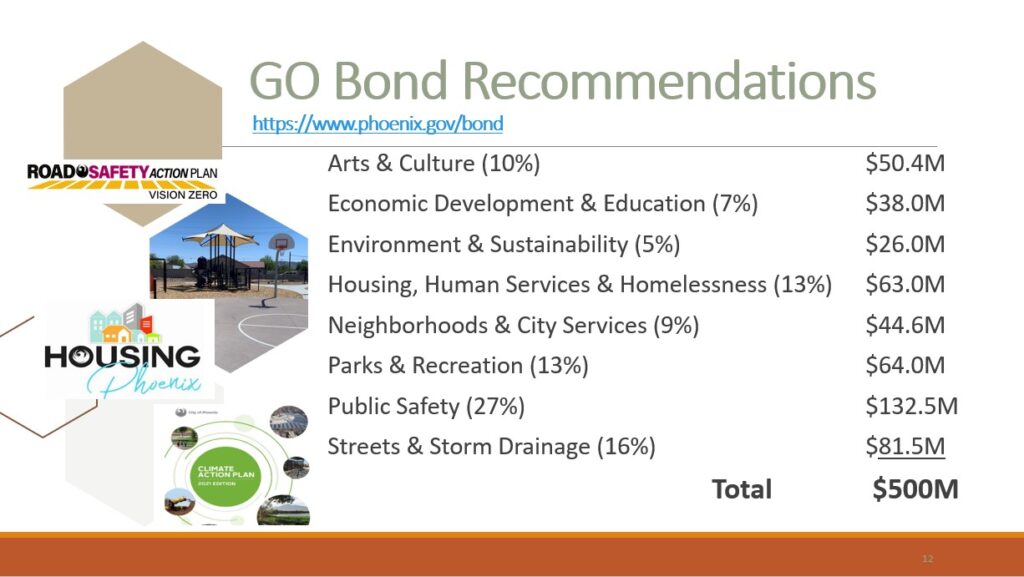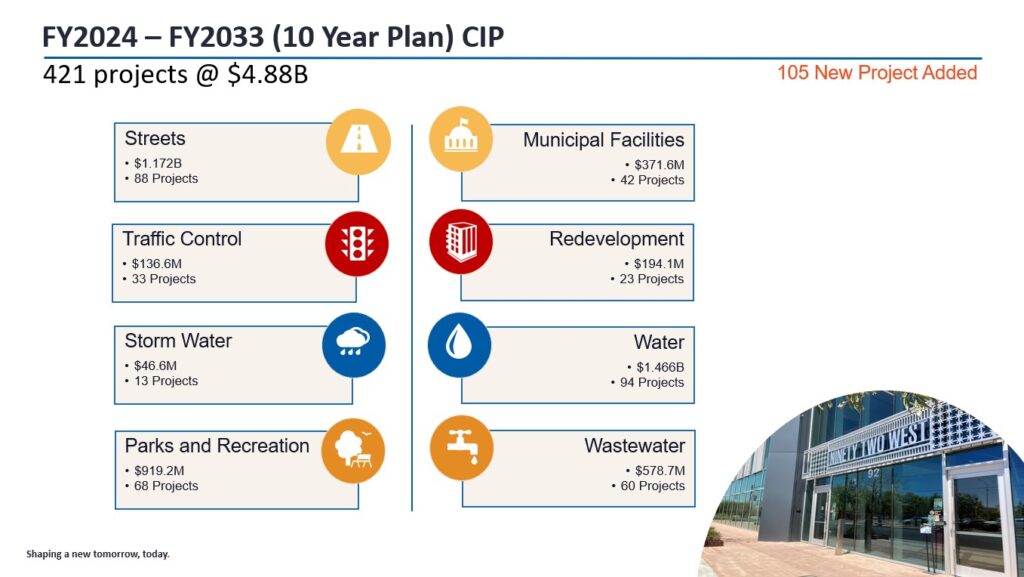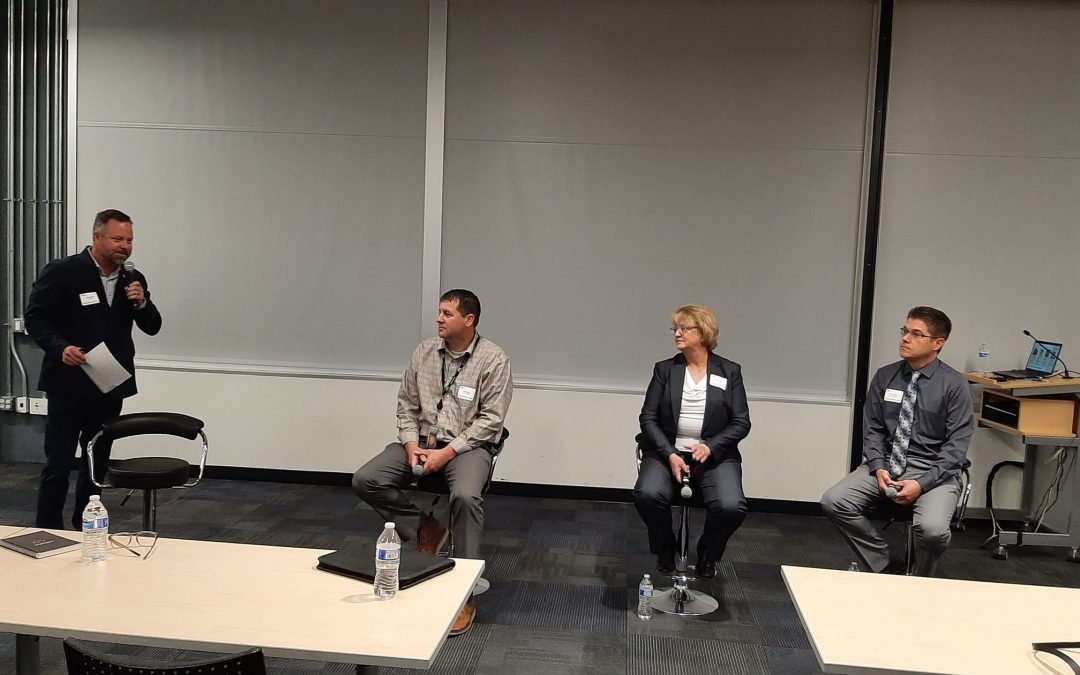Nearly 120 people descended on SkySong this week for BEX Companies’ April Leading Market Series event. The session’s theme was “Upcoming Public Works Projects.”
Sundt served as the event sponsor.
After a brief introduction from BEX Founder and President Rebekah Morris, the panel of leading public works officials wasted no time diving into their current project lists, along with some spirited discussion on the state of the public project market, challenges and potential solutions.
The panel was comprised of:
- Moderator Jeff Hamilton—VP of Transportation & SW Region Business Development Manager, Sundt;
- Lance Webb—Assistant City Engineer, City of Mesa;
- Susanna Struble—Assistant City Engineer & CIP Manager, Town of Gilbert; and
- Eric J. Froberg—City Engineer, City of Phoenix.
Phoenix
After settling in, Froberg led off the panelists with a rapid-fire presentation of more than 25 upcoming projects in wastewater, water, aviation, and street transportation. Among the projects mentioned were:
- Cave Creek Water Reclamation Plant Expansion, $365M,
- 91st Avenue Wastewater Treatment Plant 1A Rehabilitation, $60M,
- Large Diameter Sewer Rehabilitation Program, $100M,
- Water Main Replacement Program, $150M over five years, and
- Phoenix Sky Harbor New Crossfield Taxiway U, $260M.
Taken together, Froberg said Phoenix has $3.78B in water/wastewater projects, $1.7B in aviation projects and $949.9M in street projects.

He then dovetailed his presentation into a brief overview of Phoenix’s planned $500M General Obligation bond request. The current bond recommendations provide funding for eight different project categories, including $38M for Economic Development and Education, $64M for Parks and Recreation, and $81.5M for Streets and Storm Drainage.
Gilbert
Following Froberg was Gilbert’s Susanna Struble. Using materials prepared for an upcoming Capital Improvement Plan stakeholders’ meeting, she walked the attendees through an overview of the 421 projects currently included in the upcoming Fiscal Years 2024-2033 CIP. The total includes 105 newly added projects.
The project breakdown for the CIP consists of:
- Municipal Facilities: 42 projects, $371.6M;
- Parks & Recreation: 68 projects, $919.2M;
- Redevelopment: 23 projects, $194.1M;
- Storm Water: 13 projects, $46.6M;
- Streets: 88 projects, $1.172B;
- Traffic Control: 33 projects, $136.6M;
- Wastewater: 60 projects, $578.7M, and
- Water: 94 projects, $1.466B.

In addition to recapping the CIP project suite, Struble said Gilbert will probably start discussions for a new General Obligation bond request in 2024.
Mesa
Following Struble was Mesa’s Lance Webb. Webb summarized Mesa’s current 13-section five-year CIP approved budget and pointed out the funding allocations for each section. Key among them were:
- Water and Wastewater, $753M,
- Transportation, $390M, and
- Gas, 137.6M.
For Fiscal Year 2023/2024, Mesa has initiated 16 non-utility and eight utility projects. There are 15 future authorized non-utility projects and six authorized utility projects. Among the projects noted were:
- Mesa Public Safety Training Facility Improvements,
- Police Department Headquarters Renovation, and
- Signal Butte Water Treatment Plant Expansion.
Webb closed his recap by telling the audience there may be a 2024 General Obligation bond request coming from Mesa as well. The key project areas would fall under Parks, Recreation and Community Facilities; Library; Transportation, and Arts and Culture.
Challenges and Solutions
Both during their presentations and in the question-and-answer period Hamilton led afterward, all of the panelists touched on the challenges their cities face in moving projects from planning to construction to delivery.
Webb said, and the other panelists echoed to varying degrees, the key challenges are:
- Cost overruns and construction material delays,
- Increased labor costs,
- Inflation impacts commodities, services and contracts, and
- Keeping up with growth while maintaining current infrastructure.
Froberg said he needs pricing to “deescalate a little” and asked vendors to do what they can to share the pain of the current problem set and work with officials to ensure projects can be begun and finished.
He also advocated splitting projects into more manageable components when possible and issuing early letters of intent in advance of procurements to ensure materials are available when needed.
Struble said Gilbert has taken a close look at value engineering for its various projects and has been assertive in shifting project timelines so that projects can be delayed, if necessary, without having to be canceled entirely.
Webb agreed that reevaluating projects, adjusting timing and reprioritizing based on needs is essential in the current environment.
All three emphasized that designers, builders and other vendors need to act as partners with the cities providing the work to the fullest extent possible. Struble recommended that firms should get to know their municipal partners, come to them with ideas and share their project visions and recommendations.
Webb admonished vendors to evaluate their capacities and timelines correctly, to communicate consistently over the entire course of planning and development, and to let the project owner know about any potential problems or complications as early as possible.


 STEVE BOSCHEN
STEVE BOSCHEN WENDY COHEN
WENDY COHEN ERIC FROBERG
ERIC FROBERG





